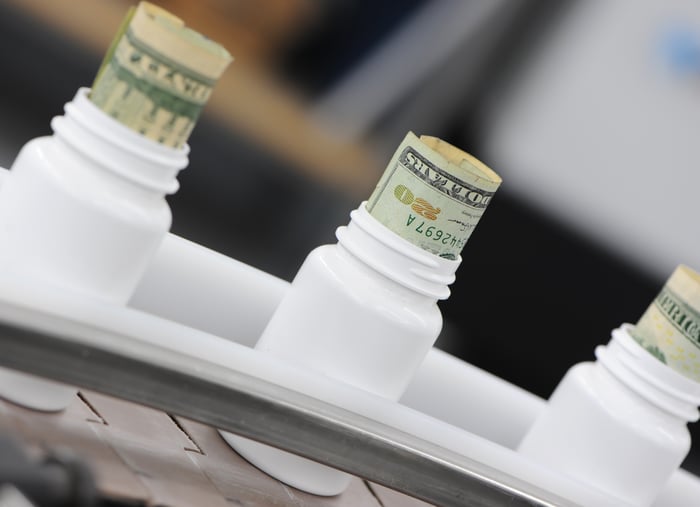Pfizer (PFE -0.36%) has brought several game-changing medicines to market since its inception more than a century ago. Some of the best-selling drugs in history are Pfizer products, including the cholesterol-lowering drug Lipitor, which still ranks as the top-selling drug of all time. Other massive winners include the antidepressant Zoloft, the nerve pain drug Lyrica, the anti-inflammatory drug Celebrex, and the erectile dysfunction drug Viagra.
Pfizer's knack for developing winning drugs has been a boon for long-term shareholders. The company's stock has soared over the last few decades on the back of soaring revenue and profits growth. In response to the prosperity, Pfizer has split its stock on numerous occasion since its IPO in 1978:
|
Date of Split |
Stock Split |
100 Shares in 1980 Would Now Be |
|---|---|---|
|
July 01, 1983 |
2 for 1 |
200 shares |
|
April 01, 1991 |
2 for 1 |
400 shares |
|
July 03, 1995 |
2 for 1 |
800 shares |
|
July 01, 1997 |
2 for 1 |
1,600 shares |
|
July 01, 1999 |
3 for 1 |
4,800 shares |
DATA SOURCE: YAHOO! FINANCE.
Do stock splits matter?
Before the advent of electronic trading, it was much easier for brokers to buy and sell stocks in round lots, which are 100 shares at a time. By contrast, buying and selling in odd lots -- meaning any order between 1 share to 99 shares -- were much more difficult. This fact was one of the reasons many companies chose to split their stock since it would make it easier for shareholders -- especially individual investors -- to buy and sell in blocks of 100.

Image source: Getty Images.
Nowadays, investors can easily buy and sell securities in odd lots, so companies no longer feel the need to split their stock as often.
Why haven't Pfizer's shares split in such a long time?
You might have noticed that it has been a long time since Pfizer last split its stock. In fact, almost two decades have passed since the company's last split.
One major reason behind the big gap is that Pfizer's market cap has largely headed in the wrong direction since the early 2000s.
PFE Market Cap data by YCharts.
What's the cause of Pfizer's underperformance? You can largely blame the decline on two primary factors. First, at its peak in the early 2000s, Pfizer's stock was trading for more than 75 times earnings. That's simply too rich of a valuation for such a large and mature business. Second, the company's revenue and net income growth has been stuck in the mud for many years as it has dealt with the loss of patent protection on several important drugs.
When combined, these factors have kept a lid on the company's share price appreciation, which has negated the need for the company to perform a stock split.
What's next for Pfizer?
While the last two decades haven't been great for Pfizer's shareholders, there are ample reasons to believe the future is looking bright.

Image source: Getty Images.
First, Pfizer's financials look poised for steady growth over the coming years thanks to the continued growth of a few recently launched blockbusters. Included in this list is a next-generation blood thinner called Eliquis that is being co-marketed with Bristol-Myers Squibb. Sales of Eliquis grew 47% last year to $2.5 billion. Two other recent winners include breast cancer drug Ibrance and rheumatoid arthritis drug Xeljanz. These drugs are already pulling in more than $1 billion in annual sales and grew by 46% and 45%, respectively, last year.
Second, Pfizer's pipeline also offers investors reason for hope. The company believes it could launch 15 potential blockbusters drugs in the next five years alone. For perspective, Pfizer only brought five new blockbuster drugs to market over the past half-century, so the pipeline provides a lot of reason for optimism.
Finally, Pfizer's current valuation isn't pricing in a lot of growth. Shares are currently trading hands for 12 times forward earnings, which is less than half of the average company in the S&P 500. That's quite low when considering that Wall Street expects profits to grow in excess of 6% annually over the next few years. What's more, income investors will also like that this company's dividend yield tops 3.5%.
All in all, Pfizer looks like an attractive value stock right, even though the company probably won't need to split its stock anytime soon.






